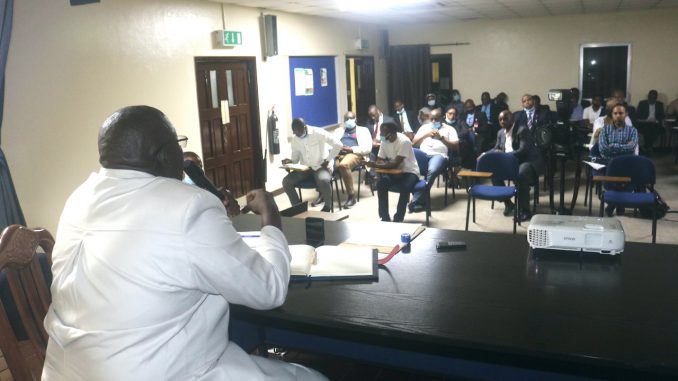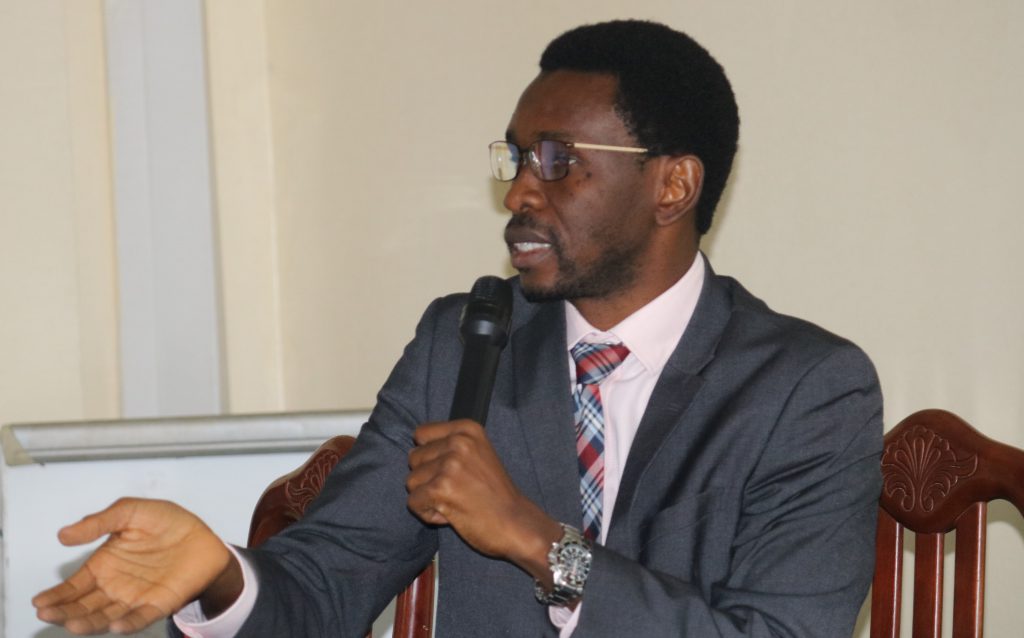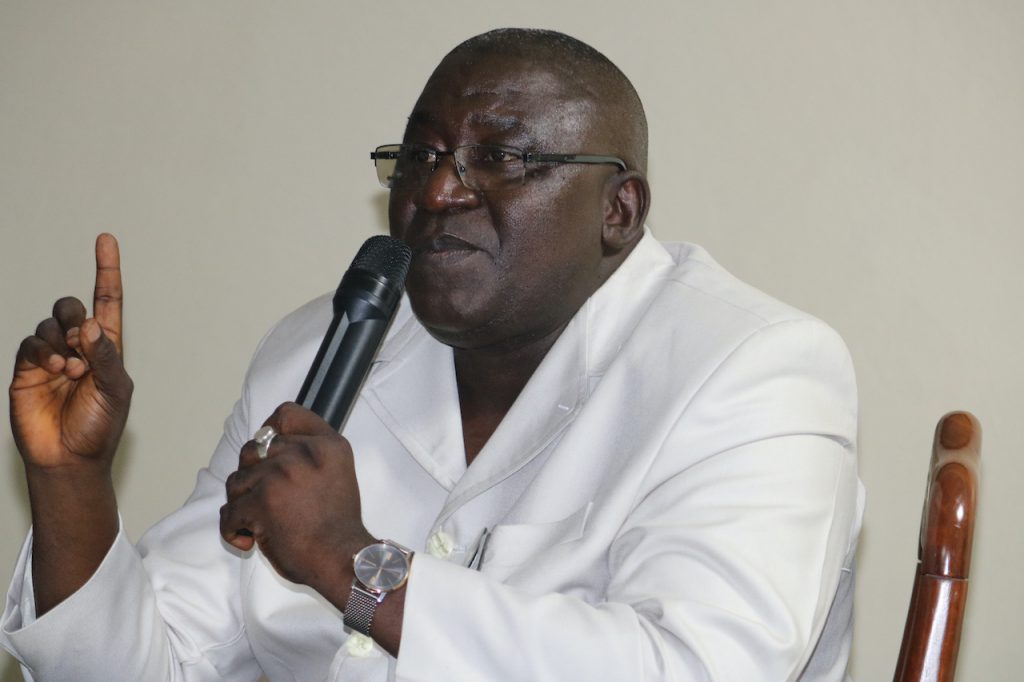
(Freetown Thursday – April 14, 2022)
The National Civil Registration Authority (NCRA) now has a chip-based securitized biometric digital identification platform which the banking sector can use to identify customers in real time.
The service, known as eKYC – Electronically Know Your Customer – now makes identification easier using the customer’s unique identifier which is the National Identification Number (NIN). This is particularly so for people who have registered their civil details or personal information with the NCRA.
The Authority in collaboration with the Central Bank of Sierra Leone Thursday engaged commercial banks at the Sam Bangura Building at Gloucester Street in Freetown, to share the information on the platform, now up and running at the NCRA for a fee of ten thousand dollars (USD 10,000) per bank per month.
The effort is part of the Authority’s on-going mandate as recently ratified by the Sierra Leone Parliament in partnership with Constrat Systems (SL) Ltd to produce securitized chip-based multi-purpose IDs with recent technology security features.

Bank of Sierra Leone’s Assistant Director of Banking supervision, Philip Bangura says they at the Central bank have been concerned that they do not have access to national identity data. “So, we’ve been working with NCRA to see how they can help to solve the issue of the KYC”, he said.
Bank of Sierra Leone’s Assistant Director of Banking supervision, Philip Bangura, who chaired the meeting, said, the non-existent of digital identity was a problem in the banks, which has led to the challenge of easy customer identification, giving rise to identity manipulation to the comfort of the manipulator. He cited the often-referenced utility bills used by banks as proof of identity, which, he said, were not accurate because many times utility bills are in the name of the landlord, thereby creating the risk to transact with customers.
“We at the Central bank have been concerned but we don’t have access to national identity data. So, we’ve been working with NCRA to see how they can help solve the issue of the KYC. So, they have about six million citizens and non-citizens in their database so far which I believe is a good starting point for all of us”, Bangura said.
Also, when it comes to the issue of credit reference report, he said, it was common knowledge that reports are sent very late. The reason, he said, was that they had to search by name and many Sierra Leoneans carry similar names. Hence, searches would take hours. “But with the national ID number, we only look for a set of numbers – it’s either in the database or it’s not in the database – so, that makes life easy and faster…now NCRA has come up with a solution where you can verify”, he maintained.
Another issue he mentioned was with cheques. He said when people take cheques to the banks, they’re asked for an ID which is photocopied and attached to the cheque. With the securitized, multi-purpose digital identification that carries a unique National Identification Number, identification is easier and faster, he explained.

NCRA Director General, Mohamed Mubashir MASSAQUOI shares with Commercial bank representatives the advantages the new digital KYC platform will accord them. With the new credit reference, the inconveniences of the past including delays in identification will all disappear.
NCRA’s Director General Mohamed Mubashir MASSAQUOI, followed Bangura’s statement with a presentation titled Identity Verification System – Digital Identity for eKYC and Credit Reference Lookup for Financial Inclusion in Sierra Leone.
The presentation centered mainly on the new digital platform that NCRA together with Constrat Systems partners have established which the banks could use for easy identity verification of their customers. To operationalize the system through which the banks would access data from the center, NCRA and Constrat Systems would provide the hardware, software and other technical support to the banks “at a reasonable fee of $10,000 per month” for every bank, MASSAQUOI explained.
The cost triggered a heated debate among the banking sector representatives as several speakers felt the monthly fee was high and some even felt it would drive away customers at a time when Sierra Leone was thinking of a strategy for financial inclusion for everyone.
Sallieu Kabbah from the Union Trust Bank was pleased that the digital inclusion was taking place alongside the national financial inclusion strategy. But if a bank is paying as much as $10,000 for basically validating identity, how would banks recover the cost and how would this cost affect the National Financial inclusion strategy, he asked?.
Mohamed Alhaji Koroma from Access Bank was also concerned about the cost for the service. He said costing the service in dollars contravened the Sierra Leone law which states that every transaction taking place within the country must be done in Leones.
On the question of bad loans, Bangura said the platform would come with a credit reference service where it would be easy to identify customers with bad loans and those on good standing. He said the NCRA will provide the ID; the Central Bank will provide the credit report. For now, he said, the system misses a few people with names. The same customer known as Philip Bangura in one bank would show up as Philip Osman Bangura in another bank. Hence the urgent need for banking institutions to enroll with the NCRA unique identity system. “With the unique ID, you can write Philip Bangura, Philip O Bangura or Philp Osman Bangura, if the number is the same, you are the same person”, he said. He also addressed the question on the cost in dollars; that whatever was going to be agreed will be cost in Leones.
For fraudulent clients or customers, MASSAQUOI cited how the system has wiped off ghost workers or double dipping from the government payroll leaving a sanitized payroll system. He said a similar system will be adopted to weed out bad customers.
The DG said the cost to businesses when their systems are pilfered, far outweighs the $10,000 monthly cost for the fast and reliable digital identification system.
“With the credit reference, the inconvenience people have faced; the delays that you have encountered in the past in determining authentic credit reference report; now you have it with ease”, he said.
Other speakers wanted more information on the effectiveness and reliability of the system; whether there was a third party that hosts the server; what biometric features of the user the system will carry and challenges associated with the softwares and hardwares; updating and repairs.
The first meeting with the banks was to start the process of consultation and discussions, Bangura said. “We would have to continue this engagement … let’s meet again… We will find a way to have a win win”, he said.
In attendance were staff of NCRA, representatives of Constrat Systems, SL Ltd and other financial service providers.
© IEC Directorate
Leave a Reply